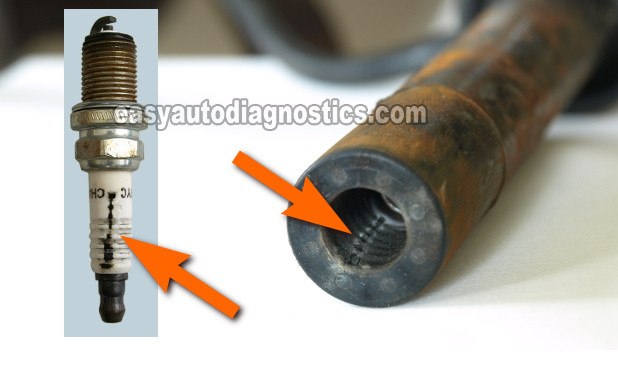TEST 4: Swapping Ignition Coils

For the last test, you'll check that the ignition coil (that isn't sparking) receives an activation signal from the PCM.
You can easily accomplish this test by swapping the ignition coil with a good (sparking) ignition coil.
If you tested all ignition coils for spark (in TEST 1), you know which ones are sparking and which one you can use for this test.
If the good ignition coil sparks connected to the non-sparking ignition coil's connector (while cranking the engine), you can conclude that the connector is delivering the activation signal from the PCM.
The wire that delivers the activation signal from the PCM to the ignition coil is the one labeled with the letter B.
These are the test steps:
- 1
Disconnect and remove the ignition coil that did not spark.
- 2
Remove one of the other ignition coils from its place. This coil should be one that sparked when tested in TEST 1.
- 3
Connect the good ignition coil to the non-sparking ignition coil's electrical connector.
- 4
Connect the HEI spark tester to the ignition coil.
- 5
Ground the HEI spark tester with a jump start cable directly on the battery negative (-) terminal.
- 6
Place the non-sparking ignition coil in the location of the good one, connect it to the electrical connector, and bolt it down.
- 7
Have your helper crank the engine when everything is set up.
- 8
The good ignition coil should spark.
Let's examine your test results:
CASE 1: The ignition coil sparked. This is the correct and expected test result and lets you know that the fuel injection computer is supplying an activation signal to the non-sparking ignition coil's electrical connector.
You can conclude that the ignition coil is defective if you have confirmed that:
- The ignition coil is not sparking (TEST 1).
- The ignition coil is getting 10 to 12 Volts (TEST 2).
- The ignition coil is getting Ground (TEST 3).
- A good ignition coil sparked when connected to the non-sparking ignition coil's connector (this test section).
Check out my ignition coil recommendations here: Where To Buy The Ignition Coil And Save.
CASE 2: The ignition coil did not spark. This test result lets you know that the activation signal is not present in the non-sparking ignition coil's electrical connector.
Without this activation signal the ignition coil will not spark. The most common causes of this missing activation signal are:
- A bad/damaged ignition coil connector.
- An open-circuit problem in the wire between the ignition coil's connector and the fuel injection computer's connector.
- A bad fuel injection computer (very rare).
Although it's beyond the scope of this tutorial to troubleshoot this problem, you have eliminated the ignition coil itself as the cause of the misfire. Once the ignition coil receives its activation signal it will function again.
Other Common Misfire Causes

Besides a bad ignition coil, quite a few other issues will cause an engine cylinder to misfire.
If you've tested and confirmed that an ignition coil is not behind your Chevrolet Colorado or GMC Canyon's misfire, the following testing tips/suggestions may help:
- Check for carbon tracks on the inside of the ignition coil's boot (see photo above).
- You'll have to remove all of the spark plugs and visually inspect their ceramic insulators and the inside of each spark plug wire boot to see if carbon tracks have developed. The photo above shows you what a carbon track looks like inside the boot and on the spark plug.
- Check to see if the ignition coil and spark plug are swimming in engine oil inside the spark plug tube.
- Check the to see if the dead cylinder's spark plug is broken.
- The dead cylinder has a compression problem.
- You can find the engine compression test here: How To Test Engine Compression (2004-2006 2.8L Chevrolet Colorado, GMC Canyon).
- Intake manifold gasket leaking air into the engine.
- The dead cylinder's fuel injector is bad.
More 2.8L Chevrolet Colorado (GMC Canyon) Tutorials
You can find a complete list of 2.8L Chevrolet Colorado (GMC Canyon) tutorials and wiring diagrams here:
Here's a list of articles you'll find there:
- How To Test The Electronic Throttle Body (2004-2006 2.8L Chevrolet Colorado, GMC Canyon).
- How To Test Engine Compression (2004-2006 2.8L Chevrolet Colorado, GMC Canyon).
- Blown Head Gasket Tests (2004-2006 2.8L Chevrolet Colorado, GMC Canyon).
- TAC Throttle Body Wiring Diagram (2004-2006 2.8L Chevrolet Colorado, GMC Canyon).

If this info saved the day, buy me a beer!


